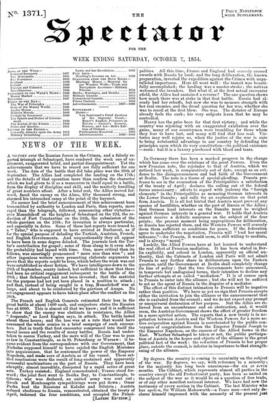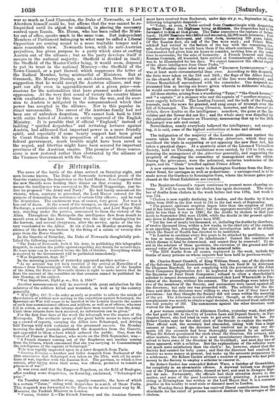By degrees the country is coming to unanimity on the
subject of the war. By degrees, we say, with reference to a minority; for the majority has long been unanimous—for six or seven months. The Cabinet, which represents almost all parties in the country except the old Protectionist party, has been as united on the subject of the war as it would be on a question of free trade, or of any other manifest national interest. We have had now the testimony of every section in the Cabinet. The last Minister who has spoken, Sir William Molesworth—a Peace man—not only de- clares himself impressed with the necessity of the present just
war as much as Lord Clarendon, the Duke of Newcastle, or Lord Aberdeen himself could be, but affirms that the war cannot be re- linquished until its *eat be attained, in placing the necessary control upon Russia. Mr. Hume, who has been called the Minis- ter out of office, speaks much in the same tone. But independent Members of Parliament belonging Ito what may be ettiled a Liberal Opposition are coming round to a more tractable temper and a more reasonable view. Newcastle town, with its anti-Austrian prejudices, has given purpose to a party which aims at casting Austria out of the alliance ; but as the party develops itself it merges in the national majority. Sheffield is divided in itself; the Sheffield of the Master-Cutler being, it world seem, disposed to put its trust in the national Ministry—the Sheffield of the Town-Council, or a part thereof, which suppresses the letter of the Radical Member, being mistrustful of Ministers. But at Greenook, Mr. Murray Dunlop, an anti-Austrian, throws out the suggestion that he would accept the Austrian alliance, and sup- port our ally even in aggrandizement at a given price—con- cessions for the nationalities that have groaned under Austrian oppression. At the very first sound of victory the country blazes with exultation ; for by this time it likes the war, and its aver- sion to Austria is mitigated in the companionhood which that power has accepted in the alliance. Nor is this popular in- stinct unreasonable. The career of the Austrian family had not been one of unbroken despotism. We cannot look back to 1848 with entire hatred of Austria or entire approval of the English Ministry. It is possible that if official "England," instead of inditing " spirited despatches" and irritating lectures against Austria, had addressed that important power in a more friendly spirit, and especially if some hearty support had been given to Count Stadion with his proposition of a constitutional and federal government, much trouble might have been saved in the sequel, and liberties might have been secured for important provinces of the Austrian empire. The promise of those conces- sions is now restored rather than obstructed by the alliance of the Viennese Government with the West.



































